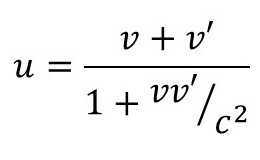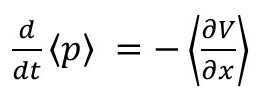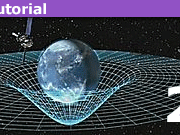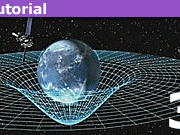Addressing the “Classical Physics Is Wrong” Fallacy
One of the common questions or comments we get on PF is the claim that classical physics or classical mechanics (i.e. Newton’s laws, etc.) is wrong because it has been superseded by Special Relativity (SR) and General Relativity (GR), and/or Quantum Mechanics (QM). Such claims are typically made by either a student who barely learned anything about physics or by someone who has not had a formal education in physics. There is somehow a notion that SR, GR, and QM have shown that classical physics is wrong, and so, it shouldn’t be used.
There is a need to debunk that idea, and it needs to be done in the clearest possible manner. This is because the misunderstanding that results in such an erroneous conclusion is not just simply due to a lack of knowledge of physics, but rather due to something more inherent in the difference between science and our everyday world/practices. It is rooted in how people accept certain things and not being able to see how certain ideas can merge into something else under different circumstances.
Before we deal with specific examples, let’s get one FACT to straighten out:
Classical physics is used in an overwhelming majority of situations in our lives. Your houses, buildings, bridges, airplanes, and physical structures were built using classical laws. The heat engines, motors, etc. were designed based on classical thermodynamics laws. And your radio reception, antennae, TV transmitters, wi-fi signals, etc. are all based on the classical electromagnetic description.
These are all FACTS, not a matter of opinion. You are welcome to check for yourself and see how many of these were done using SR, GR, or QM. Most, if not all, of these, would endanger your life and the lives of your loved ones if they were not designed or described accurately. So how can one claim that classical physics is wrong, or incorrect, if they work, and work so well in such situations?
What is true is that we discovered a more accurate, and more general description of our world. In this description, it turns out that classical physics appears as a “simplification” or “approximation” whereby it becomes more and more valid as various parameters approach the common, everyday, terrestrial values. This is an extremely important point to remember because, since classical physics works under our ordinary situation, any new theory or description must somehow converge and look like the classical physics description under such ordinary conditions. Otherwise, this new theory must show that it produces the same set of results as classical physics for all of our known phenomena that classical physics can already accurately describe.
So in this part of the article, I will show two specific examples where the more general theory of SR and QM merge smoothly into the classical physics form when one adopts the appropriate approximation. This means that at some limit, both SR and QM descriptions will be the same as the classical description.
Table of Contents
Example 1: Special Relativity Velocity Addition
The first example is from SR and deals with the velocity addition in different inertial reference frames. This is illustrated in the figure below:

The reference frame S’ is moving with velocity v concerning reference frame S. A vessel is moving with velocity v’ concerning S’ frame. What is u, the velocity of that vessel concerning frame S?
The “normal” way to find this velocity is using what is known as Galilean transformation. Here, since both v and v’ and in the same direction, the velocity of the vessel concerning the S frame is a simple addition, i.e.
u = v + v’ (1)
Keep that result in mind.
Now let’s look at how we do this in SR, which is the more general description of such kinematics. Here, we use what is known as the Lorentz transformation. Using the figure from above as before, the velocity u of the vessel in the S frame is:
 (2)
(2)
where c is the speed of light in a vacuum.
Now, this looks different than the Galilean transformation that we are used to in Eq. 1. This works for reference frame S’ at any velocity v, even if it approaches c. At that value, Eq. 1 does not work, and the velocity addition that we are used to fails miserably.
However, what happens when v«c, i.e. when reference frame S’ moves much slower than the speed of light? This is what we normally encounter, i.e. someone moving in a vehicle or an airplane. For v«c, Eq. 2 simplifies quite a bit. Without having to do any kind of Taylor series expansion on the denominator of Eq. 2, we can already see that the ratio vv’/c^2 « 1, i.e. it is a very small fraction less than one (v’ cannot be greater than c). This means that, to a good approximation, the denominator of Eq. 2 is essentially just 1.
When that happens, Eq. 2 then simplifies to u = v + v’, which is exactly Eq. 1! We got back our familiar result when we applied the more general equation (Eq. 2) to our normal, terrestrial condition! This means that all of the velocity addition equations and concepts that we already know using Galilean transformation are derivable from the more general Lorentz transformation equations. The Lorentz transformation is the more accurate, more encompassing description of velocity addition, while the Galilean transformation, which is what we know and are familiar with, is simply a special case for when the other reference frame is moving much slower than the speed of light. Eq. 1 isn’t wrong. It has a limited range of situations when it is valid or accurate enough.
Example 2: Quantum Mechanics Rate of Change of Momentum
In classical Newtonian mechanics, for an object with mass m, we know about Newton’s Second Law that relates the force F and the resulting acceleration a, which is
F = ma
This familiar equation can be written in a more general form, which is in terms of the time rate of change of momentum p, i.e.
F = dp/dt (3)
We also know that force F can be related to the potential energy (V) gradient, i.e.
F = – dV/dx (in 1D) (4)
So that is from the classical mechanics’ side. Let’s look at what it says on the QM side. Here, we use the Ehrenfest theorem, which says:
 (5)
(5)
Here, H is the Hamiltonian, Q is an operator representing any observable, the square bracket represents the commutator, and the angled bracket represents the average value. These are all the standard notations used in QM.
So what if we want to find the time rate of change of the momentum, p? In QM, p is an operator representing the observable momentum. Thus, Eq. 5 becomes
 (6)
(6)
From here, it requires quite a bit of knowledge on how to perform the commutator and take the average. You may read the full derivation of it here. In the end, what you end up with is:
 (7)
(7)
This says that the time rate of change of the average value of the momentum p is equal to the average of the gradient of the potential energy V. But this equation is equivalent to Eq. 3 and 4 from classical mechanics! They have identical forms!
It says that what we typically measure in our everyday lives are the “average” values of many, many, many values at the QM level. The QM description has made the connection to the classical description under the condition that the QM observables have been averaged. Again, as in the case of velocity addition, we get back the classical description from a more general starting point, in this case, a QM description, upon applying a particular condition to the QM picture. It shows that the classical picture is not wrong. It is the average over a large number of QM observables.
Moral of the Story
- Classical physics WORKS for our ordinary situation, so it HAS to be valid at some level.
- Classical physics is derivable from SR and QM under special conditions that apply to our ordinary situation.
- Any theory MUST have the ability to show that it merges with the classical description when applied to an ordinary situation.
- This can only be shown mathematically. It cannot be shown convincingly via hand-waving or qualitative arguments. It is the equivalent mathematical form that shows that one theory can derive the other.
What this implies here is that, if there are more general and more accurate theories beyond QM, and SR/GR, then those theories must also show that they can be “simplified” into the mathematical forms of QM and SR/GR. Subsequent, more general theories must show that they can derive the mathematical forms of existing, already-working theories. The inability to do that will be a fatal flaw in any new theory.
I mentioned towards the beginning of this article that the inability to comprehend this concept of a more general idea merging and agreeing with something less general may have something to do with the differences between science and our everyday lives. It is unusual for many people to accept the possibility that a simplistic, less sophisticated, and different idea is a subset of a more general principle. The fact that one can actually start with a more general principle, apply certain criteria, and then get a seemingly different concept, is not something a lot of people are familiar with, or would even accept.
It is why for someone not trained in physics, the idea that classical mechanics can be derived from seemingly a different animal of QM or SR/GR would not even cross his/her mind. Yet, in science/physics, this is quite common. We always show how new ideas and theories will turn into the old, tested, and well-known ideas and theories under the appropriate parameters. It is very seldom that old theories are discarded wholesale.
PhD Physics
Accelerator physics, photocathodes, field-enhancement. tunneling spectroscopy, superconductivity








All theories are merely approximations. Newtonian physics is an approximation that is demonstrably incomplete under the context of relativity. Maxwell’s equations approximate QM, and so forth. Even relativity and quantum mechanics are believed to be approximations that will be iteratively supplanted by as of yet unknown higher order theories. Nobody real scientist expects to ever see a true GUT – an absolute and final authority on the rules of the universe.
I think only philosophers care about "truth" and "right/wrong". (And perhaps mathematicians.) As much as I love philosophy, I am starting to see why these discussions are not allowed on PF.And because the discussion still seems to be focused on the word "wrong", this thread is closed.
Again, you are making the unjustified “approximation” means “wrong” claim. In the classical domain the experimental evidence validates Newtonian mechanics.No, it is justifiable. I agree it can be disputed, which is why I said it is a fine point, but that is the philosophical discussion I thought the mentors were trying to avoid.
The simple point is that the word choice in the Insight was poor.
I am amazed and puzzled by the amount of discussion triggered by this article, not even remotely controversial. I'd say the message of the article was pretty clear, so using all this sophistry to rip the article apart acts only to discourage the author from ever again publishing anything us laymen can understand. I know I would be.
I think only philosophers care about "truth" and "right/wrong". (And perhaps mathematicians.) As much as I love philosophy, I am starting to see why these discussions are not allowed on PF.What sophistry? The correct point is that even though Newtonian mechanics has been shown to be wrong, it is still useful.
Newtonian physics is only an approximation to the "true or truer theory of reality", and is still wrongAgain, you are making the unjustified “approximation” means “wrong” claim. In the classical domain the experimental evidence validates Newtonian mechanics.
I am amazed and puzzled by the amount of discussion triggered by this article, not even remotely controversial. I'd say the message of the article was pretty clear, so using all this sophistry to rip the article apart acts only to discourage the author from ever again publishing anything us laymen can understand. I know I would be.
I think only philosophers care about "truth" and "right/wrong". (And perhaps mathematicians.) As much as I love philosophy, I am starting to see why these discussions are not allowed on PF.
No, the context for this discussion is in the classical domain where (tautologically) classical mechanics is right as has been validated by a multitude of experimental data. This is precisely the point of the article which you seem to be missing.I disagree, ZapperZ opens by mentioning SR/QM/GR etc. In that context, it is completely standard to say that Newtonian physics is wrong. ZapperZ's choice of words is unconventional.
Also, it is a fine point whether Newtonian physics is "right" and without error even at low speeds. It is reasonable to consider SR is the better description of reality, so even at low speeds, Newtonian physics is only an approximation to the "true or truer theory of reality", and is still wrong.
It is basically the poor choice of words in the Insight that is triggering the discussion, otherwise there would have been no need for Orodruin to try say in an earlier post "Besides, it is not what the insight is talking about. It is addressing the ”so it should not be used” issue. Discussing anything else here would seem off topic to me."
Besides, it is not what the insight is talking about. It is addressing the ”so it should not be used” issue. Discussing anything else here would seem off topic to me.
Yes, but in the context of the discussion the question which theory is true was settled by experiments a century ago, and no longer open. Today we already know that it is classical mechanics which is wrong,No, the context for this discussion is in the classical domain where (tautologically) classical mechanics is right as has been validated by a multitude of experimental data. This is precisely the point of the article which you seem to be missing.
The fact that classical mechanics is demonstrably invalid in the quantum or relativistic domains does not change the fact that it is demonstrably valid in the classical domain. All it does is limit the domain of validity of classical mechanics, not invalidate it in the classical domain.
Furthermore, classical mechanics is a part of both relativity and QM, so classical mechanics cannot be “wrong” and relativity/QM be “right”. If you call relativity “right” then so is classical mechanics since it is part of relativity.
Today we know that classical mechanics is wrong and GR/SM are better,No, classical mechanics remains as right today as it was in the 1800’s. All of the evidence that validated it then still validates it today. None of those experimental confirmations have gone away.
Evidence outside of the classical domain establishes the domain of validity of classical physics, but does not invalidate it in the domain where other experiments validated it.
Thread reopened. Please note that general discussion of the philosophy of science is off topic.
Thread closed while the moderators review whether further discussion is likely to be productive or not.
Means all the postings will be deleted again, even if they are about important things about philosophy of scienceThe criterion for what topics are allowed for discussion here is not what you, or anyone else, thinks is important. It is whether the question can be settled by experiment. Questions about philosophy, including philosophy of science, can't. So discussions of them end up with people simply restating their opinions and nothing ever getting resolved. Just as is happening with this discussion.
what is criticized would completely destroy the justification for studying TOE or QG?If you don't think funding of study of TOEs or QG is justified, PF is not the place to argue that point. You need to convince the people who are actually providing the funding.
I treat true and false, right and wrong as binary categories.Yes, that's obvious. And I'm pointing out to you that, as applied to scientific theories, this treatment is useless, since we have never found a true theory by this definition, and the binary categorization fails to capture the actual useful distinction between theories, namely, how accurate they are when compared to the data.
Of course, there will be always some minor disagreements. But is there anything serious enough that one can reasonably say the SM has been falsified by observation?Neutrino masses. Neutrinos are massless in the standard model but need to be massive in order to accommodate neutrino oscillations, an observed phenomenon. Of course, this does not stop us from using the standard model whenever neutrino masses can be ignored, which is most of the time.
You also have precision measurements such as the muon anomalous magnetic moment or the invisible Z decay width, which do not agree with their standard model predictions.
As a particle physicist I can tell you that this is factually wrong.
I am not going to comment on the other fields that I am not working in.Of course, there will be always some minor disagreements. But is there anything serious enough that one can reasonably say the SM has been falsified by observation?
Yes you are, even if you are not realising it. Science does not care about "truth" in the way you are presenting it. The way you are presenting it is very close to an idealised religious view.It is standard correspondence theory of truth, as, for example, defended by Popper.
In the case of your underlying "truth", no. These discussions cannot be settled by experiment and therefore do not belong in empirical sciences.Discussions about the scientific method are, of course, not empirical science themselves. Which is a triviality. (Ok, you can propose different alternative scientific methods, leave different groups of scientists developing science following them, and compare the results. But this is not really what is done in discussions about the scientific method.)
If you want a scientific discussion you should, in principle, in the end (when all predictions have been made) go out and measure something to determine who was right. There is a reason we typically do not engage in philosophic discussions here.The obvious reason is that such discussions are unwanted here and will be simply deleted. Beyond this, there is no good reason to avoid in a scientific forum discussions about the scientific method, and discussions about the scientific method are inherently not discussions about particular scientific theories, but about methods to find and evaluate them.
Sure, such an error exists, but if the error in the approximation is smaller than the experimental precision then neither theory is wrong. In other words, what determines whether a theory is wrong is disagreement with experiment, not disagreement with another theory. The error discussed here is therefore not directly relevant to the validity of a theory.Yes, but in the context of the discussion the question which theory is true was settled by experiments a century ago, and no longer open. Today we already know that it is classical mechanics which is wrong, and therefore all for what it remains possibly useful is to compute approximations for better theories. Similarly
You have the purpose of this calculation backwards. The purpose of computing the difference between Newtonian mechanics and relativity in the classical domain is to establish the validity of relativity. Newtonian mechanics is already validated by experiments in that domain, and therefore relativity must show that any disagreements between it and Newtonian mechanics are less than the experimental precision.This was the purpose for Einstein to show that his theories have a classical limit, or later for the correspondence principle in quantum theory. Once it was clarified in this way that former experiments which supported classical theory were not in contradiction with the new theories, this issue was settled. Today it is irrelevant. Today we know that classical mechanics is wrong and GR/SM are better, and the only justification for using classical mechanics is to use it as an approximation for these better theories.
An approximation is wrong in the sense that an approximation contains an error.Sure, such an error exists, but if the error in the approximation is smaller than the experimental precision then neither theory is wrong. In other words, what determines whether a theory is wrong is disagreement with experiment, not disagreement with another theory. The error discussed here is therefore not directly relevant to the validity of a theory.
We cannot say that all possible theories are false, because we cannot rule out that the universe is finite and discrete. If it is finite and discrete, then it is conceivable that there is a theory of everything that is perfectly accurate.The existence of something being conceivable is a very different statement from the statement of existence.
And why would this be a reason to develop some completely unnecessary theory of QG? It would not be better than GR and QT, because everything we can test is covered either by GR or by QT.That it is not testable now does not mean that it is a priori untestable.
We have the SM of particle physics, and actually nothing in particle physics is in contradiction to the SMAs a particle physicist I can tell you that this is factually wrong. I am not going to comment on the other fields that I am not working in.
I do not care about "higher forms of truth" (religious?) at all.Yes you are, even if you are not realising it. Science does not care about "truth" in the way you are presenting it. The way you are presenting it is very close to an idealised religious view.
Please note also that I would not have a problem with a philosophical discussion about various theories of truth, where the (classical and Popperian) correspondence theory of truth is questioned, and various alternatives like relative theories or consent theories of truth are defended. There are reasonable, scientific ways to discuss such things.In the case of your underlying "truth", no. These discussions cannot be settled by experiment and therefore do not belong in empirical sciences. If you want a scientific discussion you should, in principle, in the end (when all predictions have been made) go out and measure something to determine who was right. There is a reason we typically do not engage in philosophic discussions here.
Think about it this way. We cannot say that all possible theories are false, because we cannot rule out that the universe is finite and discrete. If it is finite and discrete, then it is conceivable that there is a theory of everything that is perfectly accurate.And inherently impossible to ever know if we've found one. Making a binary definition of "wrong" useless from a practical standpoint.
Following David Bohm in "Wholeness and the Implicate Order":
"Thus, it might be said that a theory is primarily a form of insight, i.e. a way of looking at the world, and not a form of knowledge of how the world is."
"So, instead of supposing that older theories are falsified at a certain point in time, we merely say that man is continually developing new forms of insight, which are clear up to a point and then tend to become unclear."
I use the standard meaning of the words, as established over centuriesThe "No True Scotsman" fallacy.
No, this is just wrong (demonstrably). The justification for studying quantum gravity is that we expect that GR and quantum mechanics to break down in particular limits.And why would this be a reason to develop some completely unnecessary theory of QG? It would not be better than GR and QT, because everything we can test is covered either by GR or by QT. Some minor issues where both are necessary are covered by QFT on curved background. Which is internally inconsistent, but once it makes all the accurate predictions, it is not wrong too. So, everything is fine.
So, in other words, you are using a different nomenclature than others have used in this thread and in linked references. That is no basis for a discussion.I use the standard meaning of the words, as established over centuries. This standard meaning tells, uniquely, that classical mechanics is wrong, and this was established by the first experiment which has experimentally falsified classical mechanics.
What do you base this on. Again, please provide references because this is just pure speculation. You do realise that many people thought everything had been discovered in the early 20th century, right?We have the SM of particle physics, and actually nothing in particle physics is in contradiction to the SM. We have GR, and a model of cosmology in agreement with GR. Dark energy may be described by the cosmological term of GR, dark matter with a simple massive scalar field not interacting with other fields, so that
all what is not covered by the SM is covered by GR. Both the SM and GR are quite similar theories, namely effective field theories. Of course, every expectation about the future remains in some sense pure speculation, but all I need is the hypothesis that two effective field theories may be unified into a single one.
Given that I do not at all claim that everything has been already discovered, why do you think your remark is relevant? (BTW, how it makes sense to claim, at a time when people have learned to see the spectral lines of various materials, without having an explanation for them, that everything has been already found is something I have never understood.)
(My emphasis) This is very very different from attaining a theory with some higher form of "truth". I hope you see the difference.I do not care about "higher forms of truth" (religious?) at all. What I care about is the standard, everyday form of truth, which rejects something as false if it is falsified by observation, internally inconsistent, or in conflict with other things considered to be true. The definition is the simple straightforward correspondence to reality. I recognize very well that there may be theories which are consistent and compatible with everything we have observed up to now but are nonetheless wrong, so that we can never be sure that we have found the truth, even if in reality we have found it. This does not make truth something higher, it is simply a consequence of our very restricted human abilities to identify false theories as false.
But that is not how people stating it puts it. The argument is typically presented in the manner described in the text. If you have not read the text and/or not understood it, I do not think you should enter the discussion after just reading the title.I have read the text and understood it. It does not prove at all what is claimed in the title '"Classical Physics Is Wrong" Fallacy'. Instead, it created a strawman "There is somehow a notion that SR, GR, and QM have shown that classical physics is wrong, and so, it shouldn’t be used." and then attacked and killed the "it shouldn’t be used" part of it. I criticize this. (If I had read somewhere only the title, I would have ignored it as I ignore the usual "logical errors made by Einstien" nonsense, but given that I don't think that PF insights is a place for such nonsense, I have taken a look at it.)
To answer your second sentence: If you had been around for any amount of time you would have realised that this is indeed a fallacy that appears in new posters from time to time.Maybe, ok. Then what I have named "the only objection imaginable" would be wrong or weak. And the suggestion to name the insight appropriately, '"Classical Physics should not be used because it is wrong" fallacy' remains.
No, your case is not finished because your argument is not valid. Again, this is how the fallacy presents itself. Instead of reading and understanding this, you have chosen to start a strawman argument, which is never a good thing to do.If a fallacy hides itself behind a true statement, this does not make the true statement a fallacy.
In this case, 'The "Classical Physics is wrong" cover for the "Classical Physics should not be used" fallacy' would be the appropriate title.
"Classical Mechanics is wrong" is not a fallacy, but a simple well-known truth.
What has surprised me are the open attacks against the very idea of truth, and the defense of the misleading title, and all this not from a single freak, but consistently from many participants:
Orodruin: "Any talk of a ”true” theory is useless and ultimately not constructive or scientific as you can never prove that your theory is ”true” in some deeper meaning."
PeterDonis: "The whole point is that "correct" and "wrong", binary categories, are not useful categories to use when talking about scientific theories and approximations."
Dale: "The experimental results are the relevant demonstration, and in the classical domain the approximation is experimentally valid. You can call it an approximation, a limit, or a flubnubitz, and what you call it does not change the experimental facts that validate it."
russ_watters: "Which – again – means you may as well use "wrong" in a relative sense so that the word is useful. Otherwise a statement like "that theory is wrong" is pointless/redundant."
Please note also that I would not have a problem with a philosophical discussion about various theories of truth, where the (classical and Popperian) correspondence theory of truth is questioned, and various alternatives like relative theories or consent theories of truth are defended. There are reasonable, scientific ways to discuss such things. But what is common to them is that they would not try to question the use of words used in the other theory of truth. If the same word, here "truth", would be given a different meaning in different theories, fine, the standard scientific way would be to introduce add a qualification to the word, say, "consent theory truth" vs. "correspondence theory truth", and this would be necessary only if the same word is used in a different meaning in the own preferred theory. If the word is not used at all in the own theory, one would leave it to the other theory which has a use for it. And the only aim which makes it useful is the Orwellian one – the evil theory will be left without the words necessary even to think about it.
Maybe I'm wrong if I see such an Orwellian element in the quotes above? I hope so.
Quite a flock of words, but no examples. Please provide an example of a true, non-actual theory.Think about it this way. We cannot say that all possible theories are false, because we cannot rule out that the universe is finite and discrete. If it is finite and discrete, then it is conceivable that there is a theory of everything that is perfectly accurate.
Can you provide examples of non-actual theories that are true?
Out of the existing theories, one can develop approximate theories which explicitly restrict their domain of applicability as well as the the accuracy of their predictions. Some of them may be true. Following standard (Popperian) scientific methodology we cannot prove they will be true even if they are true, moreover, they have much less empirical content, so it is not really a good idea to develop them in detail.Quite a flock of words, but no examples. Please provide an example of a true, non-actual theory.
Karl Popper once expressed the meat of the argument this way, "There are uncertain truths — even true statements that we may take to be false — but there are no uncertain certainties. Since we can never know anything for sure, it is simply not worth searching for certainty; but it is well worth searching for truth; and we do this chiefly by searching for mistakes, so that we have to correct them.".
But that is not how people stating it puts it. The argument is typically presented in the manner described in the text. If you have not read the text and/or not understood it, I do not think you should enter the discussion after just reading the title.ZapperZ's usage is problematic, even if one reads beyond the title:
"These are all FACTS, not a matter of opinion. You are welcome to check for yourself and see how many of these were done using SR, GR, or QM. Most, if not all, of these would endanger your life and the lives of your loved ones if they were not designed or described accurately. So how can one claim that classical physics is wrong, or incorrect, if they work, and work so well in such situations?"
because what is criticized would completely destroy the justification for studying TOE or QG?No, this is just wrong (demonstrably). The justification for studying quantum gravity is that we expect that GR and quantum mechanics to break down in particular limits. A theory of everything is a different matter, you can never say that you have demonstrably found it. At most you can have an internally consistent theory that is compatible with all data that is available.
I use different wordsSo, in other words, you are using a different nomenclature than others have used in this thread and in linked references. That is no basis for a discussion.
The claim is not that strong.Yes it is.
TOE denotes a research programNo it doesn't. Not unless you are using a different meaning for the word "research program" as well.
there is at least a reasonable hope that some other proposal may be successful, and that this success may be reached during the time of my life.What do you base this on. Again, please provide references because this is just pure speculation. You do realise that many people thought everything had been discovered in the early 20th century, right?
But not because it is not universal. It will be universal, in the sense that it would cover all particles, fields, forces, all what is covered by physics, all what we have observed.(My emphasis) This is very very different from attaining a theory with some higher form of "truth". I hope you see the difference.
I would not have started this discussion if the title would have been "The 'classical mechanics should not be used' fallacy". The only objection imaginable would have been the question where you have seen such a fallacy and why would one think that such a crank idea is worth to be discussed in a science forum.But that is not how people stating it puts it. The argument is typically presented in the manner described in the text. If you have not read the text and/or not understood it, I do not think you should enter the discussion after just reading the title. To answer your second sentence: If you had been around for any amount of time you would have realised that this is indeed a fallacy that appears in new posters from time to time. The people suffering from it indeed think it worth discussing in a science forum, which is exactly why the insight was written in the first place so that it does not have to be explained in thread after thread! Instead, you have decided (after not having been here actively) to go off on the wording in the title without actually reading/understanding what the insight is about. Yes, I would therefore expect this part of the conversation to be deleted.
A simple "ok, the title is misleading, it should have been 'classical mechanics should not be used fallacy', do you want to argue that it really should not be used?", would have been sufficient, I would have answered "Of course not, the title is indeed heavily misleading, that's all." Case finished.No, your case is not finished because your argument is not valid. Again, this is how the fallacy presents itself. Instead of reading and understanding this, you have chosen to start a strawman argument, which is never a good thing to do.
This is philosophy, not physics. Philosophy is off topic in this forum.Means all the postings will be deleted again, even if they are about important things about philosophy of science, which have serious consequences for fundamental physics, because what is criticized would completely destroy the justification for studying TOE or QG?
What do you mean by "my greater error"? You have been treating "wrong" as a binary category. Asimov isn't.I treat true and false, right and wrong as binary categories. To express what Asimov means with "wronger", which is a continuous scale, I use different words, namely the word "error", which can be greater or smaller. "Wrong" means the error is greater than zero.
Okay, then please justify the claim I just quoted above, that "all our actual theories are false".For a theory to be true, it has to be true universally. (A "partially true" theory is, similar to "wronger", inaccurate playing with words.) The established candidates for this are only two, GR and QT.
A true theory will not have singularities. GR has singularities.
A true theory will not have inconsistencies. QT, in its standard interpretation (Copenhagen) is inconsistent, it allows different descriptions of the same reality, with different cuts between quantum and classical part, and makes incompatible claims about them. Namely, that the information about the quantum part given by the wave function is complete, while in the description where the quantum part is smaller contains additional information, namely about a classical trajectory of the part between the two splits. Attempts to interpret QT without a classical part have failed, leading to absurdities like many worlds, and if one, instead, accepts that there is additional information, then QT is at least not complete. And an incomplete theory is, quite probable, not true. The quite natural completion proposed by dBB theory has infinities for the velocity near the zeros of the wave function, thus, has singularities, and therefore fails to be true.
As you see, to show that the theories are false, I have to provide arguments, and the arguments lead, naturally, to attempts to solve them by improving the theories.
It is? What is your basis for this extremely strong claim?The claim is not that strong. And the basis is, very simple, that there is even an established abbreviation for a theory which is universal, namely TOE. TOE denotes a research program, and while we cannot be sure that it will be successfully finished, and while the first attempt, string theory, clearly fails, there is at least a reasonable hope that some other proposal may be successful, and that this success may be reached during the time of my life.
A TOE following the actual research programs will be, nonetheless, a sort of a field theory, thus, full of infinities, and probably viable only as an effective field theory, and therefore also be false. But not because it is not universal. It will be universal, in the sense that it would cover all particles, fields, forces, all what is covered by physics, all what we have observed.
Can you provide examples of non-actual theories that are true?Out of the existing theories, one can develop approximate theories which explicitly restrict their domain of applicability as well as the the accuracy of their predictions. Some of them may be true. Following standard (Popperian) scientific methodology we cannot prove they will be true even if they are true, moreover, they have much less empirical content, so it is not really a good idea to develop them in detail.
Besides, it is not what the insight is talking about. It is addressing the ”so it should not be used” issue. Discussing anything else here would seem off topic to me.I would not have started this discussion if the title would have been "The 'classical mechanics should not be used' fallacy". The only objection imaginable would have been the question where you have seen such a fallacy and why would one think that such a crank idea is worth to be discussed in a science forum.
The heavy resistance from I meet here, mainly from the moderation team, is something which surprised me. A simple "ok, the title is misleading, it should have been 'classical mechanics should not be used fallacy', do you want to argue that it really should not be used?", would have been sufficient, I would have answered "Of course not, the title is indeed heavily misleading, that's all." Case finished. But, surprisingly, it is this misleading title which is heavily defended. It looks like it is really important at least to some of my opponents that there should be no longer any binary notion of theories being true or wrong.
First, it is wrong that all theories are false. Only all our actual theories are false, for various reasons.Can you provide examples of non-actual theories that are true?
The theory which obtains here such a status is a standard theory of truth,
The point is that there exists a well-defined notion, truthThis is philosophy, not physics. Philosophy is off topic in this forum.
Then, you want science by majority decisions?No. That's not what I said.
I see the only difference between his "wronger" and my "greater error" in the words used to describe the same thingWhat do you mean by "my greater error"? You have been treating "wrong" as a binary category. Asimov isn't.
it is wrong that all theories are false. Only all our actual theories are falseSince actual theories are the only ones we have any evidence about, I have no idea how you propose to justify your claim here.
to say that a particular theory is false requires justificationOkay, then please justify the claim I just quoted above, that "all our actual theories are false".
one classical problem of all of the theories of the past as well as of our actual theories – that they are not universal – is close to being solvedIt is? What is your basis for this extremely strong claim?
That is wrong. A theory can prove another theory wrong. For example, if a theory is found to be logically incoherent, then it is wrong by virtue of theory alone.This is different, this is a theory proving itself logically inconsistent. Not a new theory proving an old one wrong. It has absolutely nothing to do with what we were discussing.
You seem to prefer another theory of truth, one where to talk about truth is useless, because we have no criterion of truth so that we appear unable to prove that our statements are true.Any talk of a ”true” theory is useless and ultimately not constructive or scientific as you can never prove that your theory is ”true” in some deeper meaning. Thus, talking about it in that manner is just philosophy. Again, this is not what the insight article is about and you are therefore continuing to veer off topic.
I disagree. It is perfectly standard English, and you are splitting hairs.It is not clear what part you disagree with. If a theory can prove another theory wrong, then many crackpots will be very very happy, but it is not how science works. Newtonian mechanics was proven to make faulty predictions long before relativity and QM came along. This is why relativity and QM were developed. This is a fundamental corner stone in empirical science so I don’t think you can brush it off by saying that it is splitting hairs. What determines whether a theory is applicable in a scenario is if it accurately describes that scenario or not.
Looking at it another way. Imagine that you are a physicist in a universe where there is no perihelion precession of Mercury and you are given GR and Newtonian gravity. In that case would you say Newtonian mechanics disproved GR? If so, keep in mind that the only thing that changed was the empirical data. Thus, taking away observation, one theory cannot disprove another. On the other hand, it is certainly possible for a theory to be proven unapplicable in some limits without having a more accurate one so it is also clear that you do not need another theory to show that a theory is not applicable.
It is a clearly wrong statement. Experiment is what has shown that classical mechanics is wrong in some settings. A theory can never prove another theory wrong. That is the job of experiments..That is wrong. A theory can prove another theory wrong. For example, if a theory is found to be logically incoherent, then it is wrong by virtue of theory alone.
It is a clearly wrong statement. Experiment is what has shown that classical mechanics is wrong in some settings. A theory can never prove another theory wrong. That is the job of experiments.
Besides, it is not what the insight is talking about. It is addressing the ”so it should not be used” issue. Discussing anything else here would seem off topic to me.I disagree. It is perfectly standard English, and you are splitting hairs.
However, I would say it is not "SR, GR and Qm have shown that classical physics is wrong" that is wrong,It is a clearly wrong statement. Experiment is what has shown that classical mechanics is wrong in some settings. A theory can never prove another theory wrong. That is the job of experiments.
Besides, it is not what the insight is talking about. It is addressing the ”so it should not be used” issue. Discussing anything else here would seem off topic to me.
I suppose definitions are conventions, so people can agree or agree to disagree. For all this arguing it is tough to see why this matters; why you couldn't just say "I understand how the words are being used but prefer a different way" and leave it at that?
Maybe your issue is a philosophical issue with the goal of science? The search for an ultimate Truth? [edit: per your previous post, it appears so] Perhaps what you may be missing is that even if scientists believe they are searching for an absolute Truth, that belief is of no relevance. Why? Because it is inherently impossible to know if they've found it. So it doesn't alter the practical assumption that all theories are wrong. Which – again – means you may as well use "wrong" in a relative sense so that the word is useful. Otherwise a statement like "that theory is wrong" is pointless/redundant.Conventions do matter, and why they matter has been nicely described in Orwell's 1984. Of course, I see no politics here. But the point of Newspeak is something which can appear in changing language conventions in physics too. And the point is that some unwanted theories are left without words to talk about them, because the words normally used to talk about them have been redefined.
The theory which obtains here such a status is a standard theory of truth, truth as correspondence with reality. You seem to prefer another theory of truth, one where to talk about truth is useless, because we have no criterion of truth so that we appear unable to prove that our statements are true. Ok, if you don't like to talk about truth, don't talk about it. But, please, don't try to redefine the language, so that people who follow the classical theory of truth as correspondence with reality become unable to say that a given theory is not true.
Ok, then rather than stating, I'll ask: what is your point? Yes, there are situations where Newtonian mechanics performs very poorly (and of course others where it performs quite well). So what?The point is that there exists a well-defined notion, truth, and the point is that Newtonian mechanics is not true. There is a difference. Performing badly is a criterion for the theory being false. But there are other criteria for this. GR is not performing poorly. But it is nonetheless false. It produces singularities, and theories with singularities are wrong too, independent of how nicely they perform. Reducing the notion of truth from science, or replacing it with performing nicely in observations, has serious consequences for science itself. So, it makes it impossible to criticize GR as being wrong. There are regions, near singularities, where one may guess that it may perform poorly, but such regions are not in our Solar system, so we do not have to care. The search for quantum gravity is a loss of time, the guys would better improve computations in Newtonian theory.
No, it's not irrelevant, since it's what everyone in this discussion except you is talking about.First, this is wrong. Then, you want science by majority decisions?
I'm sorry, but you are not making sense. The difference between the theory's predictions and the actual data is information about how accurate the theory is.No. According to some theory, ##u=2pi r##. I measure u and r for some circle and get agreement in the region of 1%. Does this tell me how accurate ##u=2pi r## is? Obviously not. It tells only something about my measurement.
Asimov wasn't playing with words. He meant exactly what he said. What he said is simply something that you are apparently unwilling to accept.No. I see the only difference between his "wronger" and my "greater error" in the words used to describe the same thing, and I accept this thing.
By your definition, all theories are false. Which makes your definition useless.First, it is wrong that all theories are false. Only all our actual theories are false, for various reasons. Then, no, it does not make it useless at all. Because to say that a particular theory is false requires justification. (Which makes the difference to your "all theories are false".) Any particular justification why even our best theories are wrong point to a particular problem related with these theories. A problem which lead to attempts to solve it, finding a better theory which does not have this problem. And, even if this theory may have other problems, this will be an improvement.
Every theory we have ever had has been an approximation. On what basis would you expect some hypothetical future theory to not be?
What basis do you have for any such expectation?The basis is that one classical problem of all of the theories of the past as well as of our actual theories – that they are not universal – is close to being solved.
I didn't, except to respond to someone else talking about approximations. I still don't understand the reasoning that "approximation" is the same as "wrong". I think that it is incorrect reasoning, and I have asked a couple of times for people to justify it, but nobody has. I don't think that it is justifiable because in the classical limit Newtonian physics and relativity are approximately equal and both are experimentally validated. So "approximation" is not the same as "wrong".As far as I can tell, the discussion is mostly semantics. An approximation is wrong in the sense that an approximation contains an error. For example, for an analytical function, if we approximate the function in a small region by low order terms of the Taylor series, then the omitted terms give us an estimate of the size of the error.
So for example, ZapperZ wrote in the Insight of the OP "There is somehow a notion that SR, GR, and QM have shown that classical physics is wrong, and so, it shouldn’t be used."
I agree that the notion mentioned in his sentence is wrong. However, I would say it is not "SR, GR and Qm have shown that classical physics is wrong" that is wrong, since it is true that SR, GR and QM have shown Newtonian physics to be wrong. I would locate the error in the second part of the sentence "and so, it shouldn't be used", since it is still not wrong to use Newtonian physics for purposes where it is an excellent approximation.
Then why use word "approximation"?I didn't, except to respond to someone else talking about approximations. I still don't understand the reasoning that "approximation" is the same as "wrong". I think that it is incorrect reasoning, and I have asked a couple of times for people to justify it, but nobody has. I don't think that it is justifiable because in the classical limit Newtonian physics and relativity are approximately equal and both are experimentally validated. So "approximation" is not the same as "wrong".
But we are not talking about such situations. We are talking about classical situations where it is demonstrably not wrong.Then why use word "approximation"?
Here is an example from Rindler: https://www.amazon.com/Relativity-Special-Cosmological-Wolfgang-Rindler/dp/0198567324 (p108)
"Applied to such situations, Newtonian mechanics is not just slightly wrong: it is totally wrong."Ok, then rather than stating, I'll ask: what is your point? Yes, there are situations where Newtonian mechanics performs very poorly (and of course others where it performs quite well). So what?